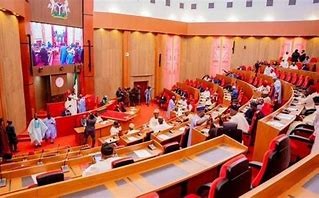On Tuesday, May 28, the Senate approved the National Anthem Bill 2024, aiming to reintroduce the former national anthem, “Nigeria, We Hail Thee.” The bill had swiftly advanced through the legislative process, being read for the first and second times last week before being referred to the Senate’s Committee on Judiciary, Human Rights, and Legal Matters for detailed examination.
The bill progressed to a third reading after the committee’s report was reviewed and approved. Senator Mohammed Monguno (APC – Borno North), the committee chairman, presented the findings and emphasized the bill’s significance, urging his colleagues to support its passage.
Simultaneously, the House of Representatives also passed the bill for a third reading last week, indicating strong bicameral support for reintroducing the historic anthem. Monguno underscored the importance of this legislative move in his presentation, highlighting the cultural and historical value of reinstating “Nigeria, We Hail Thee” as the national anthem.
He said: “The parliament considers this bill important and the National Anthem is a representation of the country’s history, culture, and people.
“The proposed bill is apt, timely, and important.”

Subsequently, the Senate convened as a committee of the whole to review and pass each clause of the bill. The former national anthem, “Nigeria, We Hail Thee,” which was initially adopted on October 1, 1960, was replaced in 1978 during the military regime of Olusegun Obasanjo.
The Attorney General’s position is in direct conflict with that of the Senators. Fagbemi cautioned that the national anthem law should not be enacted without proper consultation with the populace through a plebiscite or referendum, which he asserted is the global standard.
He highlighted that in some instances, national anthems are created through open national competitions among interested citizens. In other cases, the proposed anthem undergoes a plebiscite or referendum before being officially adopted. This process ensures public buy-in and confidence, aligning the anthem with the collective aspirations and contemporary socio-political conditions of the people.
He emphasized that the adoption of a national symbol of such significance should not be achieved solely through legislative or presidential decree.
“Consequently, it is my considered view that the decision to change Nigeria’s national anthem, whether by replacing it with the old one or a new one, should be subjected to a wider process of citizen participation through zonal public hearings, resolutions of the Federal Executive Council, Council of State, National, and State Assemblies.”
“The outcome of this process is bound to be a true reflection of the wishes of the generality or majority of Nigerians.”
Similarly, the Minister of Information and National Orientation, Alhaji Mohammed Idris Malagi, suggested broadening the scope of the bill to encompass a comprehensive discussion on national identity, rather than merely focusing on changing the national anthem.

Chief Mike Ozekhome, SAN, also urged the National Assembly to avoid hastily passing the bill and to ensure extensive consultations are conducted so that Nigerians can fully embrace and support the proposed national anthem. He stressed the importance of broadening public participation in the legislative process to achieve widespread acceptance of any new national symbol.
Despite advocating for thorough consultations, Ozekhome expressed support for replacing the current anthem, “Arise, O Compatriots,” with the original anthem, “Nigeria, We Hail Thee,” which was in use when Nigeria gained independence in October 1960. He noted that Nigeria would not be unique in this regard, as over 20 countries, including Russia, Austria, Chile, France, Saudi Arabia, China, Brazil, Iran, and Iraq, have at various times reinstated their former national anthems.
One vocal critic of the recent legislative development is Maxi Okwu, former National Chairman of the All Progressives Grand Alliance (APGA). He condemned the lawmakers for neglecting critical issues such as economic hardship and insecurity, which have plunged millions of Nigerians into severe poverty, in favor of a matter that does not address the urgent needs of hunger and safety in the country.
Okwu described the legislators’ actions as indicative of idleness and a lack of focus. He expressed astonishment that the bill managed to pass its first, second, and third readings all on the same day, calling it an irrelevant issue that distracts from the real problems facing the nation.
Highlighting the dire situation in Nigeria, characterized by widespread hunger, anger, and frustration, Okwu criticized the lawmakers for prioritizing the national anthem over more pressing concerns. He argued that the focus on such a symbolic change shows a complete loss of priorities at a time when the country is facing significant emergencies.
Sources
- https://www.channelstv.com/2024/05/28/just-in-senate-passes-bill-to-revert-old-national-anthemnigeria-we-hail-thee/amp/
- https://thenationonlineng.net/just-in-senate-passes-bill-seeking-return-to-old-national-anthem/amp/
- https://dailypost.ng/2024/05/28/nass-move-to-return-old-national-anthem-divides-nigerians/
- https://orderpaper.ng/2024/05/23/breaking-senate-reps-pass-bill-to-revert-to-nigerias-old-national-anthem




